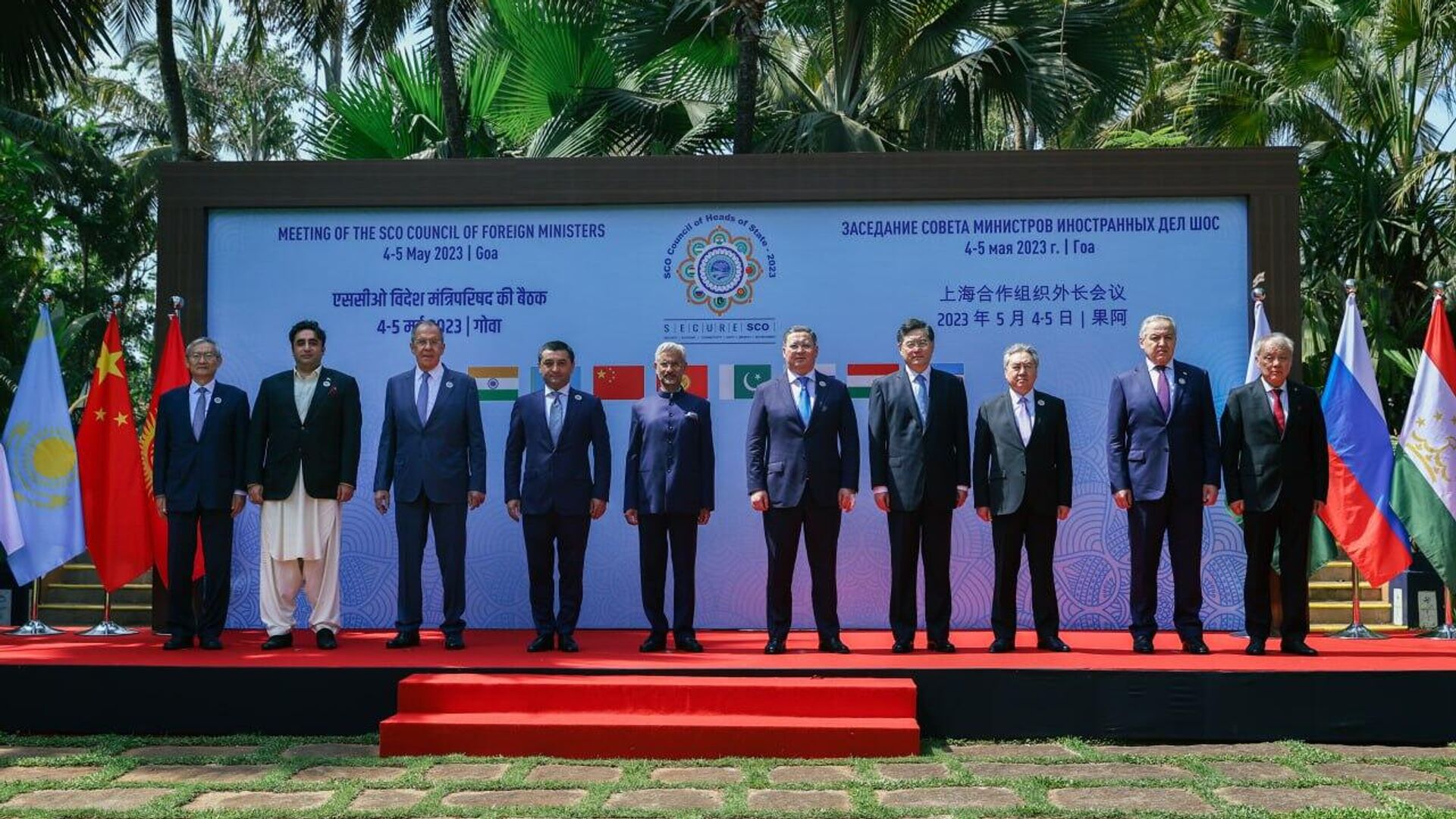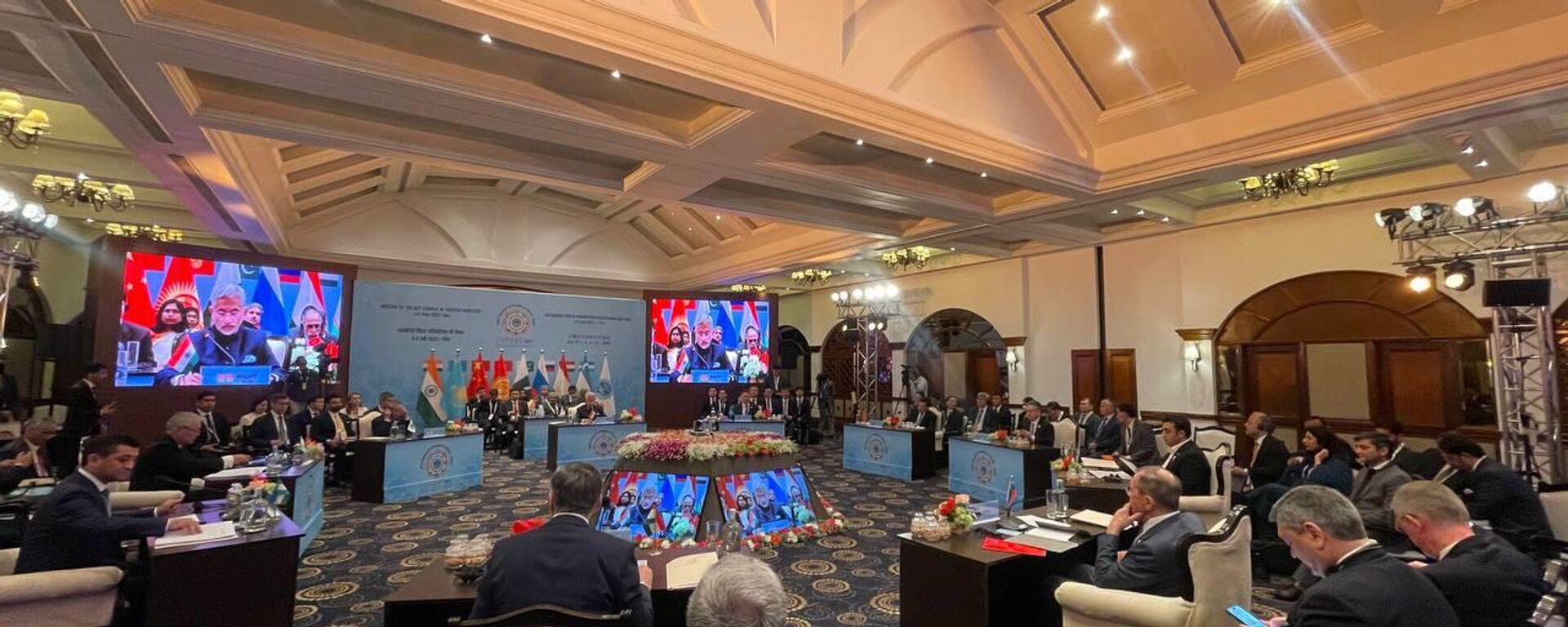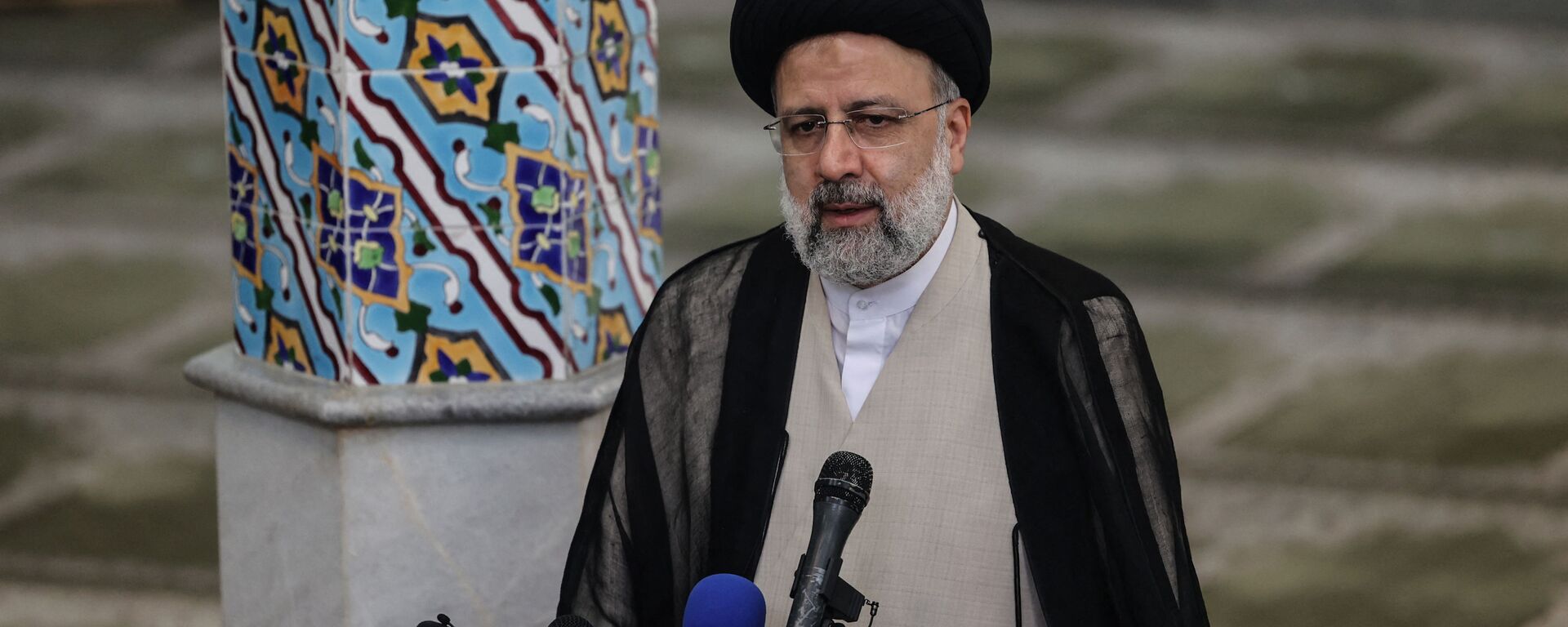https://sputniknews.in/20230505/with-growing-interest-from-non-western-nations-sco-could-turn-into-mini-un-experts-1829531.html
With Growing Interest From Non-Western Nations, SCO Could Turn Into ‘Mini-UN’: Experts
With Growing Interest From Non-Western Nations, SCO Could Turn Into ‘Mini-UN’: Experts
Sputnik India
The Shanghai Cooperation Organization (SCO) has the potential to re-fashion itself as a model mini-United Nations (UN)
2023-05-05T16:18+0530
2023-05-05T16:18+0530
2023-05-05T16:18+0530
sputnik opinion
shanghai cooperation organisation (sco)
india
s. jaishankar
russia
china
iran
saudi arabia
energy crisis
food crisis
https://cdn1.img.sputniknews.in/img/07e7/05/05/1826477_0:67:1280:787_1920x0_80_0_0_bb8767ec6f83870b6448dd6ee4aba91b.jpg
The Shanghai Cooperation Organisation (SCO) has the potential to re-fashion itself as a “model mini-United Nations (UN)", as a growing number of countries are expressing interest in joining the Beijing-headquartered Eurasian political and security grouping, experts have told Sputnik. Sachdev is also the founder President of New Delhi-based Imagindia Institute. He said that the doors of the organisation should also remain open for European states and the US, should they want to join the grouping. The expert underlined that it was crucial for the SCO to transform itself into a “new-age global organisation” in order to make a meaningful global impact. Sachdev stated that the SCO would have to clarify its position on three questions as it goes about enrolling new states, which include if it nurtures a “military agenda against the West”, would it take an “anti-West position” on all matters and if it is open to “pro-West nations” developing countries. “Otherwise, the other option is for the SCO to continue down its present path, add some more countries like Iran, and few others along the way, and work on the regional issues as it has been doing so far. However, the SCO will have to clarify the above questions sooner or later, else it will face contradictions among its members which may even make it lose its relevance and impact in the future,” he reckoned. Dr Raj Kumar Sharma, the Maharishi Kanad Fellow at Delhi School of Transnational Affairs, University of Delhi, said that countries like Saudi Arabia, Nepal and Qatar could also try and become full-fledged SCO members in the future. “India has good relations with these countries and is unlikely to oppose their membership,” he suggested. The comments come against the backdrop of the SCO Council of Foreign Ministers (CFM) meeting in Goa, where Indian foreign minister S Jaishankar noted that significant progress has been made in full-time membership applications for Iran and Belarus. Jaishankar also said that the SCO has signed an MoU to induct four new dialogue partners--Kuwait, Myanmar, the UAE and the Maldives—into the grouping. Iran Could ‘Counter Western Pressure’ Through SCO Membership Sachdev said that Tehran’s accession to the SCO presented it with a “good opportunity” to counter “western pressure” and “avoid isolation”. New Delhi is also involved in developing the port of Chabahar, which it says will “unlock the economic potential” of central Asia by creating trade opportunities between New Delhi and Afghanistan, central Asia and beyond. Dr Sharma said that the SCO membership for Iran could help the Persian nation “revive its economy” through transit revenues as it tries to reduce dependence on hydrocarbon exports. He noted that Iran has good relations with all the other SCO states as well as potential members such as Saudi Arabia, which would also hold Tehran in good stead.
https://sputniknews.in/20230505/sco-vows-to-make-a-global-differences-as-trust-wanes-in-world-institutions-jaishankar-1825273.html
https://sputniknews.in/20230503/iran-ready-to-join-brics-and-build-multipolar-world-raisi-1804605.html
india
russia
china
iran
saudi arabia
chabahar port
Sputnik India
feedback.hindi@sputniknews.com
+74956456601
MIA „Rossiya Segodnya“
2023
Sputnik India
feedback.hindi@sputniknews.com
+74956456601
MIA „Rossiya Segodnya“
News
en_IN
Sputnik India
feedback.hindi@sputniknews.com
+74956456601
MIA „Rossiya Segodnya“
Sputnik India
feedback.hindi@sputniknews.com
+74956456601
MIA „Rossiya Segodnya“
iran sco membership, sco foreign ministers meeting 2023, sco foreign ministers, bilawal bhutto india visit, chabahar port india
iran sco membership, sco foreign ministers meeting 2023, sco foreign ministers, bilawal bhutto india visit, chabahar port india
With Growing Interest From Non-Western Nations, SCO Could Turn Into ‘Mini-UN’: Experts
China, India and Russia—the biggest economies of the SCO—have been critical of the UN and other west-led global institutions over their failure to address the issues of food, fuel and fertilizer crisis, which have been affecting the developing nations.
The Shanghai Cooperation Organisation (SCO) has the potential to re-fashion itself as a “model mini-United Nations (UN)", as a growing number of countries are expressing interest in joining the Beijing-headquartered Eurasian political and security grouping, experts have told Sputnik.
“The SCO can definitely take a broader perspective and become a part of some global format of non-western nations. It could have a Security Council, a General Assembly, even raise a Peace Keeping Force, and be a model mini-UN, which could collaborate and assist the UN to address global challenges,” Robinder Sachdev, a geopolitical and economic diplomacy analyst, has said.
Sachdev is also the founder President of New Delhi-based Imagindia Institute.
“Patterned by the UN, the norms and practices of the SCO should be equitable, democratic, and will be based on the reality of the 21st century… The SCO has the historic opportunity to become the modern, ideal, mini-United Nations of Asia, Africa, and Latin America,” stated Sachdev.
He said that the doors of the organisation should also remain open for European states and the US, should they want to join the grouping.
The expert underlined that it was crucial for the SCO to transform itself into a “new-age global organisation” in order to make a meaningful global impact.
Sachdev stated that the SCO would have to clarify its position on three questions as it goes about enrolling new states, which include if it nurtures a “military agenda against the West”, would it take an “anti-West position” on all matters and if it is open to “pro-West nations” developing countries.
“Otherwise, the other option is for the SCO to continue down its present path, add some more countries like Iran, and few others along the way, and work on the regional issues as it has been doing so far. However, the SCO will have to clarify the above questions sooner or later, else it will face contradictions among its members which may even make it lose its relevance and impact in the future,” he reckoned.
Dr Raj Kumar Sharma, the Maharishi Kanad Fellow at Delhi School of Transnational Affairs, University of Delhi, said that countries like Saudi Arabia, Nepal and Qatar could also try and become full-fledged SCO members in the future.
“India has good relations with these countries and is unlikely to oppose their membership,” he suggested.
The comments come against the backdrop of the SCO Council of Foreign Ministers (CFM) meeting in Goa, where Indian foreign minister S Jaishankar noted that significant progress has been made in full-time membership applications for Iran and Belarus.
Jaishankar also said that the SCO has signed an MoU to induct four new dialogue partners--Kuwait, Myanmar, the UAE and the Maldives—into the grouping.
Iran Could ‘Counter Western Pressure’ Through SCO Membership
Sachdev said that Tehran’s accession to the SCO presented it with a “good opportunity” to counter “western pressure” and “avoid isolation”.
“Iran’s accession to the SCO is certainly a welcome step. It will help the SCO block countries to better address issues of connectivity and trade, and regional development in general,” the Indian expert underscored, noting Tehran’s geographical position at the crossroads of key connectivity projects such as the International North South Transport Corridor (INSTC).
New Delhi is also involved in developing the port of Chabahar, which it says will “unlock the economic potential” of central Asia by creating trade opportunities between New Delhi and Afghanistan, central Asia and beyond.
Dr Sharma said that the SCO membership for Iran could help the Persian nation “revive its economy” through transit revenues as it tries to reduce dependence on hydrocarbon exports.
“Iran can earn up to 20 billion dollars if it can use its potential as a transit for trade corridors,” he stated.
He noted that Iran has good relations with all the other SCO states as well as potential members such as Saudi Arabia, which would also hold Tehran in good stead.



